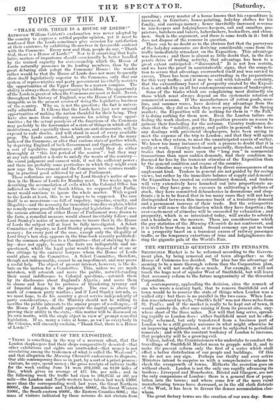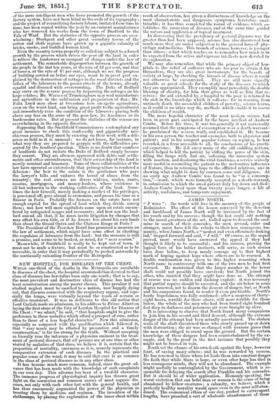THE SMITHFIELD QUESTION AND ITS PENDANTS. SMITHFIELD Market is to
be reformed according to the Govern- ment plan, by being removed out of town altogether : so the House of Commons has decided. The plan has the advantage of seemine.° to be a more thorough reform than the Corporation plan, though it will not really do so much. For example, it will not touch the huge nest of squalor West of Smithfield, but will leave that accessory reform to the future magnanimity of the thwarted
Corporation. •
A contemporary, applauding the decision, cites the remark of one who wrote a century back, that to remove Smithfield out of town would be to recover the state of things when London was a walled city : but there is no parallel in the two cases. When Lon- don was embraced in walls, "Smith's field" was not three miles from St. Paul's ; and if the market is really to be kept out of town, it would scarcely do, after once raising it from its present site, any- where short of the three miles. Nor will that long serve' spread- ing rapidly as London does : either Smithfield must not be effec- tually reformed, but only transferred from a business part of London to be a still greater nuisance in what might otherwise be an improving neighbourhood, or it must be subjected to periodical removals: and with the constant tendency of London to increase, that perplexity will be a growing evil.
Unless, indeed, the Commissioners who undertake to conduct the travellings of Smithfield Market mean to grapple with it, and to make the present reform only the first of a series which shall effect a better distribution of our people and buildings. Of this we do not see any sign. Perhaps our thrifty and ever active Ministers intend to surprise us with a comprehensive scheme to check the overgrowth of towns. Hitherto the accretion goes on without check. London is not the only one rapidly advancing its borders ; Liverpool and Manchester, Bristol and Glasgow, are not the only companions of London : there is a general flow of popu- lation into the towns ; and where some few of the more rural manufacturing towns have decreased, as in the old cloth districts of the West, it has been to favour the denser accumulation else- where.
The great factory towns are the creation of our own day. Some of the more intelligent men who hove promoted the growth ( f the factory system, have not been blind to the evils of its topography ; and the project of reruralizing factory labour, imitated from time to time, has been copied within the year by an eminent manufacturer who has removed his works from the town of Bradford to the Vale of Warf. But the statistics of the opposite process are over- whelming: Stockport and other great secondary towns of the cotton and cloth regions have grown up a gigantic calamity of bricks, smoke, and huddled human kind.
Even the country towns properly so called are subject to a forced growth by the process which drives the poor off the land in order to relieve the landowner or occupant of charges under the law of settlement. The remarkable disproportion between the growth of the people in the last ten years, at the rate of 12 per cent, and that of homes, at the rate of 4!I; per cent, although we see the progress of building carried on before our eyes, must be in great part ex- plained by the destruction of cottages in the rural districts and the influx of the labourers to the poorer streets of the towns, already squalid and diseased with overcrowding. The Duke of Bedford may carry on the reverse process by improving the cottages on his large estates; Mr. Warnes of Trimmingliam may wed manufacture and agriculture in the cultivation and preparation of flax ; Mr. Felix Loyd may show at Overstone how em rgetic agriculture, even on the worst land, can bring great profit to the agriculturist and immediately raise the condition of the labourer; placing both above any fear on the score of the poor-law, its harshness or its burdensome rates. But at present the statistics of the census are overwhelming in the opposite direction.
Supposing that the Smithfield Commissioners contemplated any great measure to check this confessedly and gigantically mis- chievous process, they must be entering on their work with a dili- gence as bold as it is unusual : we do not know, for instance, in -what way they are prepared to grapple with the difficulties pre- sented by the landlord question. There is no doubt that numbers of landlords .do not imitate the Duke of Bedford simply because they cannot. They are often so oppressed with debts and settle- ments and other encumbrances, that their ownership of the land is merely nominal and honorary. Some of these collateralities of the law have operated so extensively that primogeniture is rendered a delusion : the heir to the estate is the gentleman who pays the lawyer's bills and endures the brunt of abuse from the tenantry ; the real owners are divers widows, uncles, aunts, cousins, mortgagees, and money-lenders, whose existence is all but unknown to the working cultivators of the land. Some- times the heir himself, merely making a market of his privileges, is pensioned off, goes abroad to economize, and passes his time as a flaneur in Paris. Probably the farmers on the estate have not enough capital for the spread of laud which they divide among them ; but how will more capitalists come upon an estate encum- bered by antiquated u.iages and covenants; and how can the land- lord amend all that, if he must invite litigation by changes that may afflict his own title, or if he knows less about his own lands than about the Grand Opera and the Chateau Rouge at Paris ? The President of the Poor-law Board has promised a measure on the law of settlement, which might have some effect in checking the expulsion of labourers from the land: but the measure is still a promise, and seems to be booked, as usual, for "next session." Meanwhile, if Smithfield is really to be kept out of town, it must not be made a fixture, but must be so constructed as to be moveable, in order that it may periodically be pushed outwards by the continually extending frontier of the Metropolis.



























 Previous page
Previous page